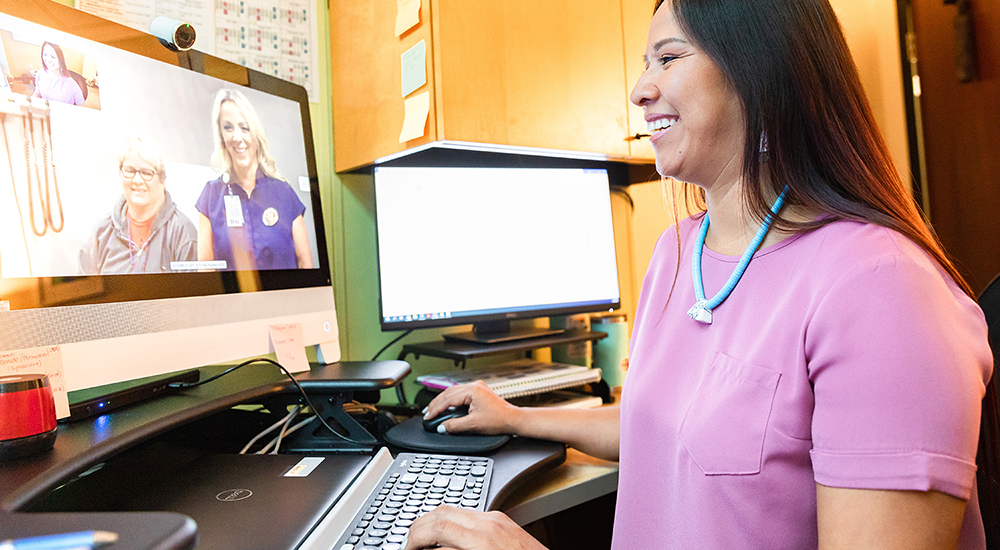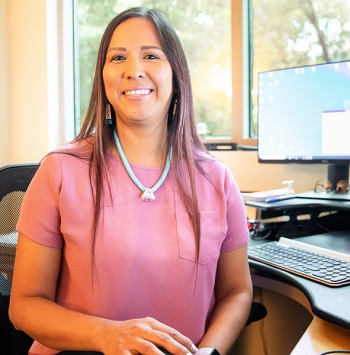Native American Celessta Merrill grew up in a matriarchal culture with many strong female family members to inspire her.
Merrill was particularly motivated by her Aunt Freda to make a difference in her own way as a medical provider caring for the Native American population. Aunt Freda served on the board of education for the Navajo Nation. Little did she know that her first nurse practitioner job in VA would find her doing just that.
Merrill, who began her VA career five years ago as a registered nurse at Salt Lake City VA Medical Center on an acute medicine unit, worked her way through school. She completed her Master of Science in Nursing, Family Nurse Practitioner degree at Westminster College in 2019.
Her VA work experience led her to complete her nurse practitioner residency as part of the first cohort of nurse practitioner residents at VA Salt Lake City Health Care System in 2020 during the COVID-19 pandemic.
The one-year nurse practitioner residency program is designed to enhance clinical knowledge with an emphasis on Veteran-centric evidence-based care.
Today, she is a primary care provider with the VISN 19 Tele-Primary Care Hub serving Veterans in rural locations in Oklahoma, Utah, Montana and surrounding areas. That includes many Veterans from the Choctaw Nation.
American Indian and Alaska natives health disparities
According to the VHA Office of Health Equity, American Indians and Alaska Natives serve in the U.S. armed forces at a higher rate than any other group.
Currently, there are more than 140,000 American Indian and Alaska Native Veterans living in the U.S. More than 74% of service connected American Indian and Alaska Native Veterans use VA health care.
American Indian and Alaska Native Veterans who receive health care through VA experience posttraumatic stress disorder at a rate of 20.5%, which is almost double the rate of PTSD as non-Hispanic white Veterans (11.6%).
American Indian and Alaska Native Veterans also experience chronic pain and have diabetes at higher rates than non-Hispanic white Veterans. The risk of having a pregnancy complicated by hypertension or diabetes is two times higher in American Indian and Alaska Native women.
Connecting to overcome cultural boundaries
“Native Americans’ lack of knowledge and mistrust of the health care system can be difficult for providers to provide the care needed in that particular population,” said Merrill.
She added that mistrust can directly impact patient compliance with medical treatment and their health outcomes.
Connecting with her Veteran patients through their shared culture and background, even though they may be from different tribes, is key according to Merrill.
“As soon as they find out I am also Native American, their tone changes toward me and their outlook on the care and treatment recommendations they have been declining for years has now changed. I love being able to impact them – even if it’s just one Veteran.”
Building trust with Veterans from different backgrounds
Merrill says her residency allowed her to work alongside physicians and nurse practitioners in several specialties which gave her confidence as a provider. She also learned how important it is to understand and connect with your patients.
Today, she is building connections with Veterans from different backgrounds across several rural communities.
“We talk about rural life, farm animals, ranching, lots of outdoors things. That’s how I grew up. I’ve been able to find things to build that connection with them.”
What she’s really building, though, is trust between provider and patient. And that trust is what sets this Nurse Practitioner and VA apart.
Learn more about VA’s Office of Academic Affiliations
Topics in this story
More Stories
Veteran Byron Potier weighed almost 300 pounds and was tired and lethargic. He was the perfect candidate for gastric sleeve surgery.
How much do you know about VA care, benefits and services? Don’t miss out on what you've earned—check out the "2025 VA Federal Benefits Guide for Veterans, Dependents, Survivors, and Caregivers" handbook to learn more.
Feeling stressed? Your breath can help you relax and focus. Take 3 minutes to reset and prioritize your well being for this week's #LiveWholeHealth practice.








I love to hear this. I am a native American veteran and feel so connected with others, like myself.thank you for sharing this
So enlightening, so very informative. Articles like this one really should reach a larger audience of the general population. Hopefully the VA will find a way to make that happen. Thank you!
Terrific story. Such great work she is doing!
Agree!